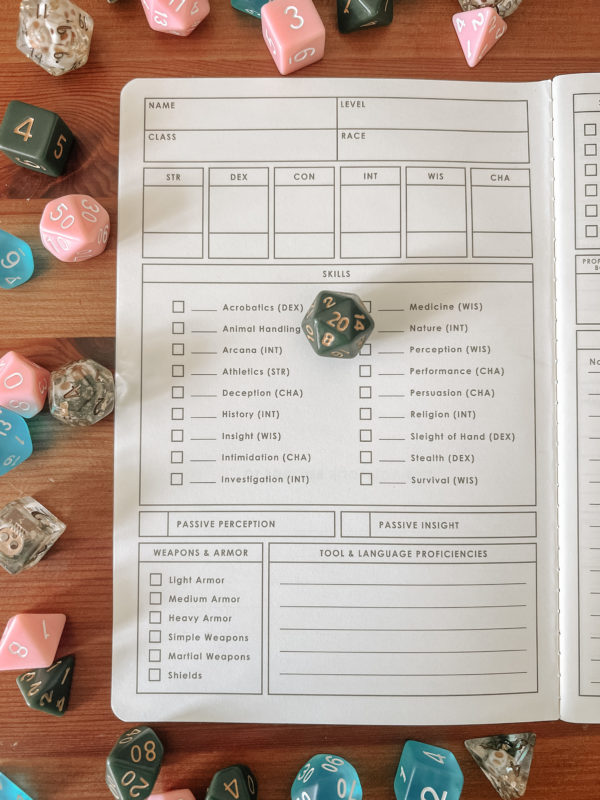Hello, everyone! Today I wanted to share my 5 favorite tips for new D&D players. These are all things I wish someone had told me when I first started playing, so I thought I’d pass along the knowledge to you. Keep in mind, though, that every D&D group is different, and there’s no such thing as one-size-fits-all advice. Feel free to use what works for you and ignore what doesn’t. Without further ado, let’s jump on in.
1. Examine Your Expectations
The first important piece of advice I have for new D&D players is to take a bit of time to examine your expectations for your upcoming campaign. There are a few big expectations new players can have that tend to lead to disappointment. The first is expecting your campaign to feel the same as any D&D shows you may have seen. Professional D&D shows are professional for a reason. Many of them (such as Critical Role) have professional actors and performers as members. Comparing your home game to them is like comparing your backyard soccer match to the world cup. You don’t need fancy character voices or 10,000 props to have a good time.
The second big one is expecting your character to be the sole star of the story. D&D is a collaborative game, and it’s good to remember this. It’s important to give your fellow players chances to talk and do cool things during the game. Another thing to keep in mind is your gm is most likely trying to balance all of the character’s backstories within the plot of the game. This means your character might not always be in the spotlight. A good D&D game is one where everyone gets to feel important.
2. Learn Early to Communicate
My second tip for new players is to learn early on how to communicate with your group. It’s especially important to learn how to communicate with your gm. If there’s a storyline you want your character to experience or an item you’d like them to own, you should communicate that. Keep in mind though D&D should be collaborative. As a gm, my least favorite campaigns have been the ones where players give me a long list of specific demands. There’s a big difference between communicating and demanding. Here’s a few examples of good vs. bad communication with your gm.
- Bad: My character needs a sword with +3 damage. When will you give it to me?
- Good: I’d like my character to have more damage abilities, such as with a new sword. Is this possible to make happen?
- Bad: You need to introduce npcs from my character’s backstory next session.
- Good: I’d like my character’s backstory to be more prominent in the campaign. I have some ideas on how we can do this that I’d love to share with you.
Specific ideas aren’t inherently a bad thing. It’s just essential to not overwhelm your gm with them. Remember – there are other players who all want things too. I recommend being open to compromise. Your gm might not be able to give you that sword with +3 damage, but they could be willing to let your character buy one. You might not get to meet npcs from your character’s backstory next session, but maybe you could meet them a few sessions later. A good gm will work with you to find solutions that work for everyone.
3. Don’t Worry About Having the Rules Memorized
Next, I want to let all you new players know it’s okay to not have all the rules memorized. Really, it is. You can always look things up during the session or ask someone for help. I google things all the time during sessions, especially when I’m gming the game. It’s just important to let your gm know you might need extra time on your turn to figure things out. Beginner-friendly games are pretty good at understanding this. If your gm is upset by this, you’re probably better off finding a new group. D&D is complex. It takes time and patience to understand, so don’t be afraid to give yourself those things. Knowing all the rules will come eventually.
4. You Don’t Need to Buy Stuff to Play
The fourth tip I have for new players is to only buy the D&D things you truly want. You honestly don’t have to buy anything to play. While you do need dice, there are tons of free digital dice apps available. The whole set of D&D basic rules is available for free online as well. Other than that, all you really need is some scrap paper, a pencil, and your character sheet. Now, you might want to buy some pretty dice or a nice journal to take notes in. I definitely did. Just know if you can’t or don’t want to you aren’t any worse of a player than people who buy lots of D&D things.
5. Let Yourself Have Fun
The last tip I have today is to allow yourself to have fun. Sometimes new players get so stressed about doing things the “right” way or impressing the other players that they forget to actually sit back and enjoy the game. You will make mistakes, just like everyone else in your party. Sometimes sessions will go very wrong. However, at the end of the day, D&D is a game. What’s the point of playing if you won’t slow down enough to have fun? Try not to get too caught up on the little things. One of the best things about learning to play D&D is getting to actually experience it.
I hope these tips are helpful to all of you new players out there. Enjoy your games, and don’t get discouraged when mistakes happen. You’ve got this!
Thanks for Reading,
Elliot J. West


Leave a Reply